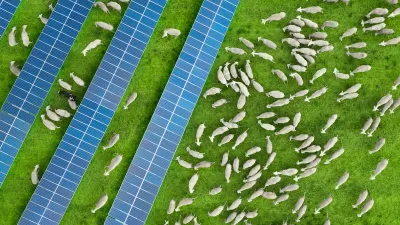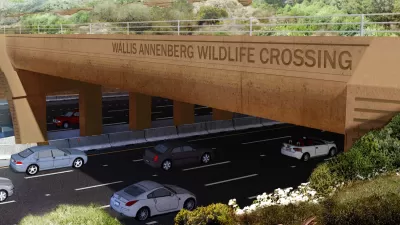The massive farm bill making its way through Congress will only perpetuate social and environmental sustainability. What's also needed is legislation to boost the urban economics of local food production, writes Christopher Cook.
"Congress is rapidly deciding the fate of America's food supply: what's grown, how it's produced and by whom, and how that food will affect our health and the planet. [T]he big picture is not pretty: increasingly centralized power over food, abetted by lax antitrust policies and farm subsidies that provide the meat industry and food-processing corporations with cheap raw ingredients; huge subsidies for corn and soy, most of which ends up as auto fuel, livestock feed, and additives for junk food, fattening America's waistlines while soiling the environment; and, despite organic food's rising popularity, a farming system that's still heavily reliant on toxic pesticides (500,000 tons per year), which pollute our waterways and bloodstreams while gobbling up millions of gallons of fossil fuel. As a nation we consume (quite literally) some 100 billion gallons of oil annually in the making and long-distance transport of our food supply."
"But even as the congressional Farm Bill battles grind toward a mostly disconcerting conclusion, it's not too soon to look beyond this omnivore's omnibus, and begin considering a national movement of progressive urban food bills. Cities and states have enormous purchasing power and are slowly taking the lead: San Francisco's Department of Public Health is devising sustainable procurement policies to buy more local and organic produce; some city and state food policy councils, such as Minnesota's, are helping smaller organic farmers survive by linking them up with urban markets; and the California Assembly last year passed a pilot measure to help develop new fresh produce markets in poor neighborhoods."
"Change is coming piecemeal on the local level, and needs a serious booster shot. A movement of progressive urban food bills could help galvanize and expand local efforts and create a new food infrastructure that truly sustains our health, ecologies and economies - and could help buck the trend toward increasingly monopolistic supermarkets that eschew poor districts and shut out small farmers and food companies."
FULL STORY: A Food Bill for America’s Cities

Pennsylvania Mall Conversion Bill Passes House
If passed, the bill would promote the adaptive reuse of defunct commercial buildings.

Coming Soon to Ohio: The Largest Agrivoltaic Farm in the US
The ambitious 6,000-acre project will combine an 800-watt solar farm with crop and livestock production.

World's Largest Wildlife Overpass In the Works in Los Angeles County
Caltrans will soon close half of the 101 Freeway in order to continue construction of the Wallis Annenberg Wildlife Crossing near Agoura Hills in Los Angeles County.

California Grid Runs on 100% Renewable Energy for Over 9 Hours
The state’s energy grid was entirely powered by clean energy for some portion of the day on 37 out of the last 45 days.

New Forecasting Tool Aims to Reduce Heat-Related Deaths
Two federal agencies launched a new, easy-to-use, color-coded heat warning system that combines meteorological and medical risk factors.

AI Traffic Management Comes to Dallas-Fort Worth
Several Texas cities are using an AI-powered platform called NoTraffic to help manage traffic signals to increase safety and improve traffic flow.
City of Costa Mesa
Licking County
Barrett Planning Group LLC
HUD's Office of Policy Development and Research
Mpact Transit + Community
HUD's Office of Policy Development and Research
Tufts University, Department of Urban and Environmental Policy & Planning
City of Universal City TX
ULI Northwest Arkansas
Urban Design for Planners 1: Software Tools
This six-course series explores essential urban design concepts using open source software and equips planners with the tools they need to participate fully in the urban design process.
Planning for Universal Design
Learn the tools for implementing Universal Design in planning regulations.























